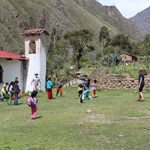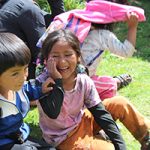Chamana is a small community in the province of Urubamba about 30 km from Ollantaytambo. There is no road access to this community so to reach it one must walk along the Inca trail for about 1 1/2 hours and then along a narrow path for another hour. The people in these communities are very poor and suffer from malnutrition. It is the only town in the area that has a school so children walk from remote communities as far as two hours away to attend school. There are 30 children ages 5 to 12 attending the school. But because of their inadequate diet and the long hike to school, it is difficult for the children to concentrate and understand the school lessons. The school itself seems sufficient and there are two wonderful, dedicated teachers there so the community itself and the local government have suggested that nutrition is the key variable precluding these children from succeeding. They have proposed a nutrition project and done baseline nutritional analysis. OMAPED, a local government organization and Alma have created a micro-finance project that will provide a long term sustainable solution to the nutritional need.
In the first 3 months, Ian Mcgroarty from Alma, an agricultural expert from OMAPED and a volunteer from Scotiabank will teach families about nutrition, growing vegetables, raising and breeding hens and guinea pigs and personal finance. We will then help families build cages and gardens and provide the animals and vegetables. Each family will get 6 guinea pigs and be responsible to return 7 guinea pigs at the end of each year (individual ownership, group liability model). Children will receive a significantly improved diet and families will also earn a little income from the sale of guinea pigs. Teaching families the value of nutrition and providing them with the tools so that they can feed themselves on a sustainable basis will improve children’s ability to attend school and to learn when they are at school.
The Alma Foundation, the Municipality of Urubamba, the Municipality of Ollantaytambo and the Communidad are each providing 1/4 of the funding/time/work required in this project. The project will begin in January 2012.
November 2012 Update
The project has been a huge success. Of the 30 families in the program all have benefited from the vegetable gardens and chickens and all but one has not been able to raise and breed the guinea pigs. The children told us about eating vegetables and learning how to cook eggs from their chickens. Soon the guinea pigs will be big enough to eat (and sell). In January we expect to receive our guinea pigs back (with one guinea pig interest). We are in the planning stage of expanding the program to two other nearby (four hours walking) communities.


